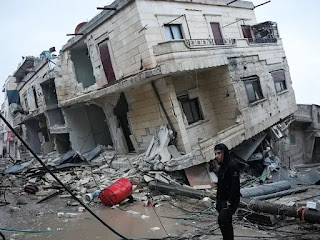In the news this week we’ve heard that at least 47000 people have died as a result of the earthquake on the Syrian/Turkish border; that millions live in fear a year on from the Russian invasion of Ukraine; that a new Brexit deal for Northern Ireland is close to being struck in the midst of political tension; that Nigeria have gone to the polls to elect a new government still moving out of the shadow of military rule; that Australia’s Prime Minister Anthony Albanese is the first to march at the Mardi Gras gay rights march. These and countless other stories have unfolded in the media glare and in dappled pools of sunlight heard only by the birds are all at their heart about life’s ultimate mystery - the nature of human relationships.
All human relationships are mysterious because they unfold a narrative of what binds and divides us which is centred on one emotion - love. That’s why those news stories move us. Grief erupts in tragedy because of love. We long for justice because of love. Love is the unifier. Love by it’s presence or absence transforms the human heart and will. It is humanity’s golden thread through our history - yet it remains an unfathomable truth.
What we hear as our first reading this morning is a telling of part of the story that binds and divides us. Genesis 2 and 3 are part of a story told by God to humanity which has three lines: I love you; I want to be with people like you; will you come and be with me? Told another way, these chapters are trying to explain the inexplicable - why are we here; why do we act and react the way we do with each other; why is there pain in childbirth etc?
It’s also worth flagging at this point a bit about the ‘Once Upon a Time’ sort of Hebrew used in the passage. Our lectionary compilers leave out the story of the creation of the woman made not as a helper (such a derogatory term) but an equal - bone of my bone and flesh of my flesh. They also leave out the commentary about a man leaving his father and mother and clinging to his wife as one flesh (this text is not at all about marriage (biblical or otherwise and the word marriage is not used here at all.) Also the same word means ‘man’ and ‘husband’ and ‘woman’ and ‘wife.’ Being ‘one flesh’ is surely as much about husbands not mistreating their wives as themselves.
'... And the Lord God commanded the man, “You may freely eat of every tree of the garden; but of the tree of the knowledge of good and evil you shall not eat, for in the day that you eat of it you shall die...'
I love walking Pip our dog early in the morning. I love the silence, the fact that it is just her and me, I love the nature in which we walk and the route we take means we are surrounded by trees. What has struck me over the last few weeks is the number of very deep conversations I have ended up having with folks - the sudden death of a mother’s partner complicated by other issues; the cloud of dementia; the impact of bullying. All of these conversations have occurred between the trees.
Lent began on Wednesday as we stood at one tree - the palm - and marked ourselves with the kiss of God’s love and reminded ourselves of our mortality and need of Him. And here, we stand at the tree of the knowledge of good and evil, and look on over the weeks of our Lenten Pilgrimage. It would do us well to note that this story about fractured relationships finds it’s fulfilment in the realising of all our hopes and dreams at the foot of another tree - the cross - where all relationships are reformed. We could understand our craving relationship with each other and our wrestling with life’s temptations; and God reaching out to each of us in love - as all being outworked between these two trees.
In our school assemblies this week we talked about saying and doing wrong things and how we might lie to avoid the blame. This is all too a human trait - notice how the serpent subtly twists God’s words (Did God say, ‘You shall not eat from any tree in the garden’?), and how the woman adds to the lie (God doesn’t prohibit touching the tree of knowledge.) Much spurious theology has been outworked from this story - but as equals, both woman and man are culpable for their actions. As we continue to journey between the tree of the knowledge of good and evil and the cross - this remains true for each of us - we each remain culpable for our actions.
What is Jesus asking of us as we take these first steps in our Lenten pilgrimage? Our first reading reminds us that we are made for relationship equally with each other and our actions and words affect those relationships, and our Gospel reminds us that our actions (prayer, fasting, almsgiving, clothing the naked, visiting the sick or imprisoned) have eternal weight in that how we act and react affect our relationship with God.
The consequences of the actions at the tree of knowledge are being outworked in Ukraine as the actions of some lead to the death of others. I don’t mean that literally as would you Adam and Eve it - it’s only a story, but the corrupting of human relationships - the right of one to have power over another - is being outworked in Kyiv and the Donbas and ultimately has led to the need for gay right marches in the first place.
This Lent, Holy Week, and Easter, Walk with Jesus, learn from Him; seek to frame all of your relationships differently as he does because how we act and react with each other affect our relationship with God.








